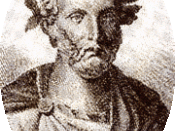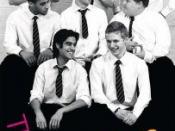Madeleine Flint
'Women's roles are often marginalised and tokenistic in dramatic comedy.' To what extent do you believe this to be the case in Alan Bennett's The History Boys?
Dramatic comedy often sees the woman take on a role of insignificance. They become the prey, the desired possession and are not seen as equal beings to male characters. This has been apparent throughout history from the very birth of comedy. Plautus for example developed his comedy from the Greek's new comedy and so also inherited a bias against woman. Any female that did appear within his works fit effortlessly into one of several stereotypical categories; the puella or young maiden, the matrona or married woman, the meretrix or courtesan, the ancilla or handmaid, and the anus or old woman. Many are never seen, merely discussed and others are seen but do not speak and never are they the protagonist of the play.
Within The History Boys, Alan Bennett introduces one meretrix who is never seen, two matrona who are also never seen and one ancilla who could be argued to be the one exemption from the tokenistic nature of the woman in the History Boys.[1: http://www.vroma.org/~araia/plautinewomen.html]
Mrs Lintott slots into the stereotype of the ancilla as she is witty and capable of interacting within the male world of the play. She represents feminism and presents the idea that not all woman are simply sexual objects to be admired and hunted. However, she seems to submit to the idea that men are in fact better at her beloved subject than her. "Men are, (clever) at history, of course." Despite this she still maintains a somewhat elevated stance on the situation. "Story telling so much of it, which is what men do naturally. My ex, for instance. He told...


